Secty of State: Gov. Tom Vilsack Campaigns for Brunner (D) in Solon
On Tuesday I heard potential 2008 presidential candidate Gov. Tom Vilsack (D-Iowa) speak at an event sponsored by the Solon Democratic Club. Although this appearance was late in a grueling day for Vilsack, he was relaxed and gracious and delivered his remarks in a measured but firm manner. He was not a rah-rah kind of speaker, at least on this occasion, but his steady Midwestern delivery felt reassuring and sincere. He thanked Aaron Golembiewski (more on him later) for a "dangerous introduction," meaning that Vilsack was exposed as a Iowa Hawkeyes football fan. Vilsack then worsened his predicament by revealing that he was born and raised in Pittsburgh and roots for the Pittsburgh Steelers. Posing the rhetorical question "Why am I here today?," Vilsack said that this is a very important year for the state and the nation, referring to the significance of 2006 elections in Ohio to the upcoming 2008 presidential election.
"Ask any Republican," Vilsack said, "Are you safer today than you were six years ago?" The answer has to be "no." Vilsack also said "there is no economic policy coming out of Washington." Job security is no longer a part of the American experience, nor is the security of health insurance and good retirement benefits. "More people under the age of thirty believe in UFOs than believe that social security will be there for them when they retire." Thus, there are a lot of anxieties in American today.
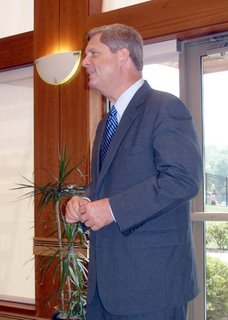
This year, however, Ohioans "have the opportunity to elect a truly, truly good person as governor." Noting that he has met extensively with both, Vilsack said that gubernatorial candidate Rep. Ted Strickland (D-Lisbon) and senatorial candidate Rep. Sherrod Brown (D-Avon) both appreciate "that there is a moral obligation to insure the healthcare of all children in Ohio." This is not just a good idea, he added, but good for business as well. Turning to Strickland's emphasis on alternative energy as a strategy for revitalizing the economy, Vilsack pointed out that Iowa has 25 ethanol plants and is 2nd or 3rd in the nation in wind production, and concommitantly is enjoying a record number of people employed. "Ted Strickland is a man of extraordinary integrity," he said, "and Sherrod Brown is a man of great passion."
Turning to Brunner's bid for secretary of state, Vilsack commented that "the rest of us around the country would like to see all the votes counted next time around." Brunner "wants to protect your right to vote, [and] your right to privacy, and to make sure that you are connected to your government." Noting that most of the audience probably knows how the OSU Buckeyes football team is ranked, he asked how many of us could tell him such rankings as the percentage of children in Ohio that are uninsured, the state's high school dropout rate, or quality of life or public safety ratings? "Nobody in state government has given you that information," he said, but "Jennifer Brenner believes you should have it in order to hold your leaders accountable." In Iowa, he said, there is a public index that informs citizens of the state's performance in such categories.
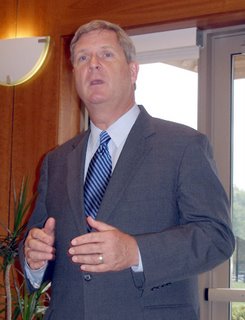
In 1988, Vilsack was the first Democrat elected governor of Iowa in twenty years, and three weeks before the election he was down by 23 percentage points. He commented that there are "people saying that you don't need government," but "there's an important reason for government -- it's because we have community values." He linked this idea to a sermon he heard recently recently about the biblical story of the loaves and the fishes at the Sermon on the Mount. Noting that he has visited the site of this event in Israel, Vilsack quoted the pastor as explaining that "Jesus removed the fear of sharing." In the last 20 years, Vilsack continued, "Republicans have made this nation fearful," but "we are all better off when we are not fearful."
Concluding, Vilsack said that he is the commander of 9,700 men and women in the Iowa National Guard. Vilsack has seen the impact of the lack of protective armor in Afghanistan and Iraq. He told about visiting a soldier in the hospital, Bobby Briggs of the 224th Engineering Battalion, who had the most dangerous assignment in Iraq -- defusing improvised explosive devices (IEDs). He lost part of his skull and his right eye in an explosion. His wife had to quit her job in order to advocate for Briggs and make sure he got the care he needed. Briggs wanted more than anything else to be at his unit's homecoming, which Vilsack explained would be an emotional and unforgettable scene. Vilsack was in fact at the homecoming for the 224th, and indeed Briggs lined up with his unit, in his wheelchair. When the unit was told to stand, Briggs stood up, something that he could not have done at the time of Vilsack's hospital visit. Vilsack called this a display of "tremendous human spirit" that "shows what's great about America." Briggs "believed in the 224th Engineering, fought for his country, and wanted to be there when they came back." That's who government should work for, Vilsack declared, so that there are jobs for people like Briggs, and health care, and retirement security, and affordable energy. We need an "America that is not afraid," he said, and this election in this state can help bring back that kind of America. "You can change the direction of this state, and you can change the direction of the nation." Ohio "went the wrong way last time because nobody told people how to vote," he said, "and I don't mean people from other states coming in and telling you how to vote." There are 93 days to the election, he pointed out, and if each of the 40 or so people in the audience called ten people every day to tell them to vote for Democrats, that could be enough to turn the election. "This is pretty important stuff," he said, "and that's why I'm here."
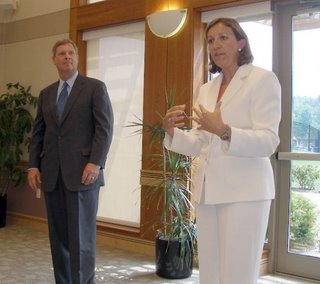
Jennifer Brunner then spoke, thanking Vilsack and his Heartland PAC for supporting her campaign. Vilsack invited Brunner to D.C., produced a podcast for his PAC's web site, and emailed 200,000 people about her campaign. "People all around the nation gave money to my campaign," Brunner said, "because people all over the nation don't want Ohio to be the albatross around the neck of the electoral process." In 2004, Brunner said, Secretary of State Ken Blackwell (R-Cincinnati) used his office and title to campaign for George Bush and Issue 1 (the anti-gay marriage amendment), which "made people think that something was wrong with how the vote was counted." There are people like Robert F. Kennedy Jr (writing in Rolling Stone Magazine) "questioning what happened in 2004," and Brunner "doesn't want that to ever happen again." Brunner "wants to do the work that this Secretary of State has not wanted to do -- just run good, clean, fair elections."
At this point the audience was invited to ask questions and the talk covered a variety of issues. Vilsack said he was in Afghanistan two months ago visiting Iowa troops. A soldier there told him that the mission "is about hope." Asked what he meant, the soldier said "you can see it in the faces of the children." They "weren't allowed to go to school before, but now they can." The "tragedy of Afghanistan," Vilsack said, "is that we stepped away from our very important mission there," with the result that there is "not as much hope as there should be." On Iraq, Vilsack said that Democratic leaders are in the process of standing up and saying "we've had enough." Over 17,000 have been injured in Iraq, and Vilsack suspects that many of those injuries could have been avoided. "A lot of mistakes have been made," he said, and we "need to find a way to transfer responsibility to Iraqis," to say to them "it's your responsibility to keep your families safe." Vilsack does not favor "an automatic, immediate withdrawal," but for withdrawal to work the Iraqis must take responsibility. In Vilsack's view, it is "not wise to have a [permanent] base in Iraq." The "better way to deal with Saudi Arabia's influence over us is to diversify our energy portfolio."
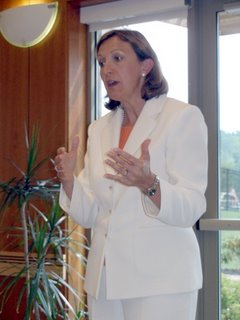
Asked whether Blackwell should be allowed to spend state funds on his "character building" materials, Brunner noted the controversy over the new "I Voted" sticker that also says "Vote Your Conscience," and also remarked that a businessman she knows received "a poem about the joys of owning a small business" along with notice of the filing of his business documents. Brunner said she likes to compare the basic functions of the secretary of state with a club secretary. Voting is like the "corresponding secretary" function, and business filings are like the "recording secretary" function. "If everything is running smoothly," she pointed out, "you shouldn't even know the name of Jennifer Brunner like you know the names of Ken Blackwell and Katharine Harris." This drew a lot of laughter and applause.
One audience member said that his hopes in Ohio elections are always crushed by the downstate vote, and questioned why the candidates seem to be focusing on northeast Ohio. Brunner said that she has been to 74 of Ohio's 88 counties, and also pointed out that she grew up in a two-stoplight town where people still pick up their mail at the post office. "All statewide candidates realize that its an 88 county race," she said, and she "learned in Franklin County that she had to do well in Republican-leaning suburbs for the vote in urban areas to be enough" for her to win. Vilsack added that the "math is simple: 20% of people identify themselves as progressives, 30% as conservatives." Therefore, Democratic candidates have to reach out to conservative votes and "respect their values."
A dentist in the audience asked Vilsack about health care costs. He said that 20-30% of all healthcare costs are administrative expenses, and "much of this could be eliminated simply with electronic recordkeeping." He also noted that the country needs a "concentrated effort to find cures for diseases that raise health care costs and insurance premiums." Finally, he pointed out that by 2013, Medicare will be generating a deficit, and "we've got to address that issue."
On whether he will run for president in 2008, Vilsack said that he has to be careful how he answers that question so that he doesn't trigger elections rules and regulations. He also said that he is now focusing on the 2006 elections, with its prospect of regaining control of Congress, and on his job as governor, which is "particularly important because there is no leadership coming from the White House." He asked the audience, "can you name one law Congress has passed that helped the people?" Other than extending the Voting Rights Act recently, we could not name anything that helped anyone but the wealthy and corporations. "Nothing happens in Washington DC today," Vilsack said, "if you want innovation or movement today, you need to work with governors."
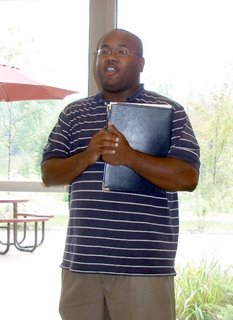
Because Vilsack arrived somewhat late and Brunner even later, several campaign aides took the opportunity to address the crowd. First to speak was Marquez Brown, pictured, who began working for the Democratic coordinated campaign that very day. Mike Cook, also present, has been a field coordinator with the campaign for two weeks.
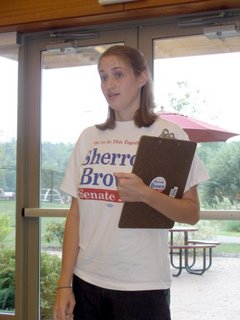
Laura Englehart, tireless volunteer coordinator for the Sherrod Brown campaign, also spoke and answered questions. When one member of the audience complained about phonebank volunteers who sound like they're reading a prepared text, Englehart sympathized but also deftly suggested that the questioner could improve the situation by volunteering to come over and do some phonebanking himself.
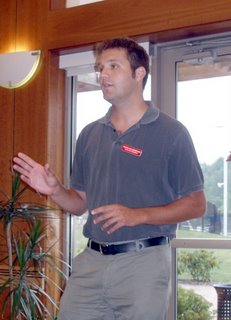
Aaron Golembiewski, campaign manager for 14th Ohio Congressional District candidate Lewis Katz (D-Pepper Pike), who was out of town, said that there are great candidates this year for whom residents of Solon can vote, including 17th Ohio House District candidate Roger Goudy (D-Solon) and Lew Katz. As to Katz' opponent, incumbent Rep. Steve LaTourette (R-Painesville), Golembiewski said that he broke his "Contract with America" promise on terms limits, he broke his promise to unions by voting for CAFTA, and he voted against raising the minimum wage seven times in the last Congress. Asked about LaTourette's proposed Theft ID law (HR 3997), Golembiewski said that it would "make it easier for people to steal your identity" by preempting state laws that allow for quickly freezing credit and instead require that consumers must obtain a police report before credit can be frozen. At that point Gov. Vilsack arrived, and Golembiewski introduced him to start the program.







1 Comments:
Great coverage as usual, Jeff. Thanks for taking the time. I do not take you for granted.
Post a Comment
<< Home